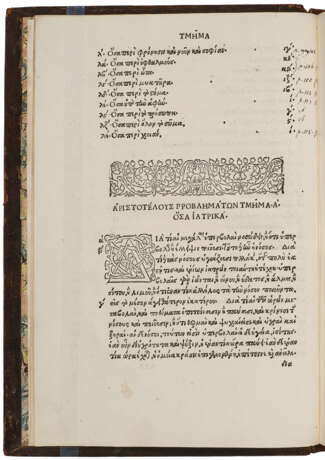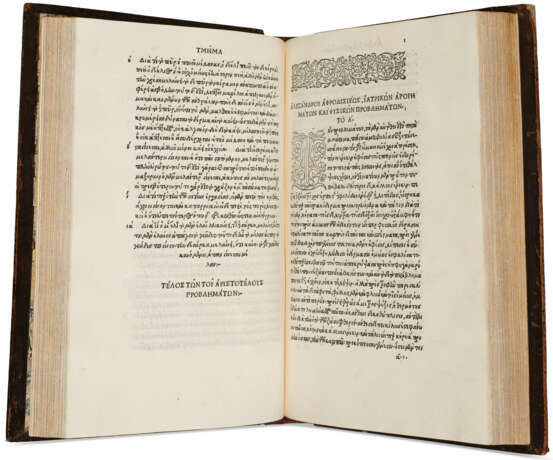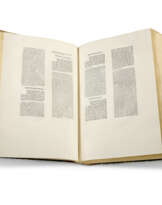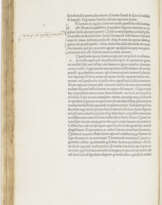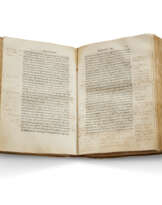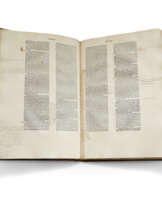ID 1236252
Lot 22 | Aristotle's Problems and Metaphysics
Estimate value
$ 7 000 – 8 000
Second half of the fourth part of Aldus's great Aristotle, the most important Greek printing project of the 15th century. “The complete works of Aristotle, printed by Aldus between November 1495 and June 1498, would have secured Aldus’s fame as a printer had he printed nothing else. The entire publication, issued separately but often bound in five or six volumes, represented more leaves of Greek type than had cumulatively been printed since the time of Gutenberg” (Clemons and Fletcher). The Aldine edition restored to posterity the polymathic works of Aristotle in their original language—and the scientists and philosophers of the next several centuries would make their reputations by either expanding on or disproving their contents. The project was an international tour-de-force, employing agents to search throughout Europe for manuscripts and gathering Greek scholars from across the continent (and England) to edit them. In the words of Aldus from the preface, "humanity may at last, after six hundred years and more of a diet of acorns, feed on fruits."
The present volume contains Aristotle's Metaphysics, which he considered to be a study of the most fundamental questions of philosophy—the examination of "being qua being." It is joined by a number of interesting pseudo-Aristotelian works, primarily the Problems. "Although rightly called pseudo-Aristotelian in their final form—thirty-eight books containing some nine hundred problems, accumulated over the centuries by the Peripatetic school possibly as late as the fifth or sixth century CE—the Problems of Aristotle developed from an authentic Aristotelian core and spawned a rigorous tradition of editions and imitations" (Bair). These pedagogical texts explore the causes of natural phenomena through strangely specific scenarios, contemplating, for instance, "why is it that our feet perspire, but not our faces, when we are in a state of nervousness, whereas under ordinary conditions our faces perspire most and our feet least?" or "why is it that in man the front of the body is more thickly covered with hair than the posterior portion, but in quadrupeds the posterior part is hairiest?" and "Why is it that man sneezes more than any animal?" Goff A-959; Bod-inc A-384 (all five parts); BMC V 556; UCLA 11; Clemons and Fletcher 11. See Ann Bair, "The Problemata as a Natural Philosophical Genre," in Natural Particulars: Nature and the Disciplines in Renaissance Europe (1999).
One of two volumes, super-chancery folio (301 x 207mm). 292 leaves (of 519, lacking general title, text of Theophrastus's Historia plantarum, and the 2 terminal blanks of the Mechanica). Types in Greek and Latin. Woodcut initials and ornaments (resized, first and last leaves a little dustsoiled). Early 19th-century black stamped morocco (front board separating, worn at extremities). Provenance: marginal annotations to Problemata contents leaf – Edward William Wynne Pendarves Stackhouse, 1775-1853 (armorial bookplate).
| Artist: | Aristotle (384 BC - 322 BC) |
|---|---|
| Place of origin: | Italy |
| Auction house category: | Antiquarian books, Medicine & science, Printed books |
| Artist: | Aristotle (384 BC - 322 BC) |
|---|---|
| Place of origin: | Italy |
| Auction house category: | Antiquarian books, Medicine & science, Printed books |
| Address of auction |
CHRISTIE'S 8 King Street, St. James's SW1Y 6QT London United Kingdom | |
|---|---|---|
| Preview |
| |
| Phone | +44 (0)20 7839 9060 | |
| Buyer Premium | see on Website | |
| Conditions of purchase | Conditions of purchase |
